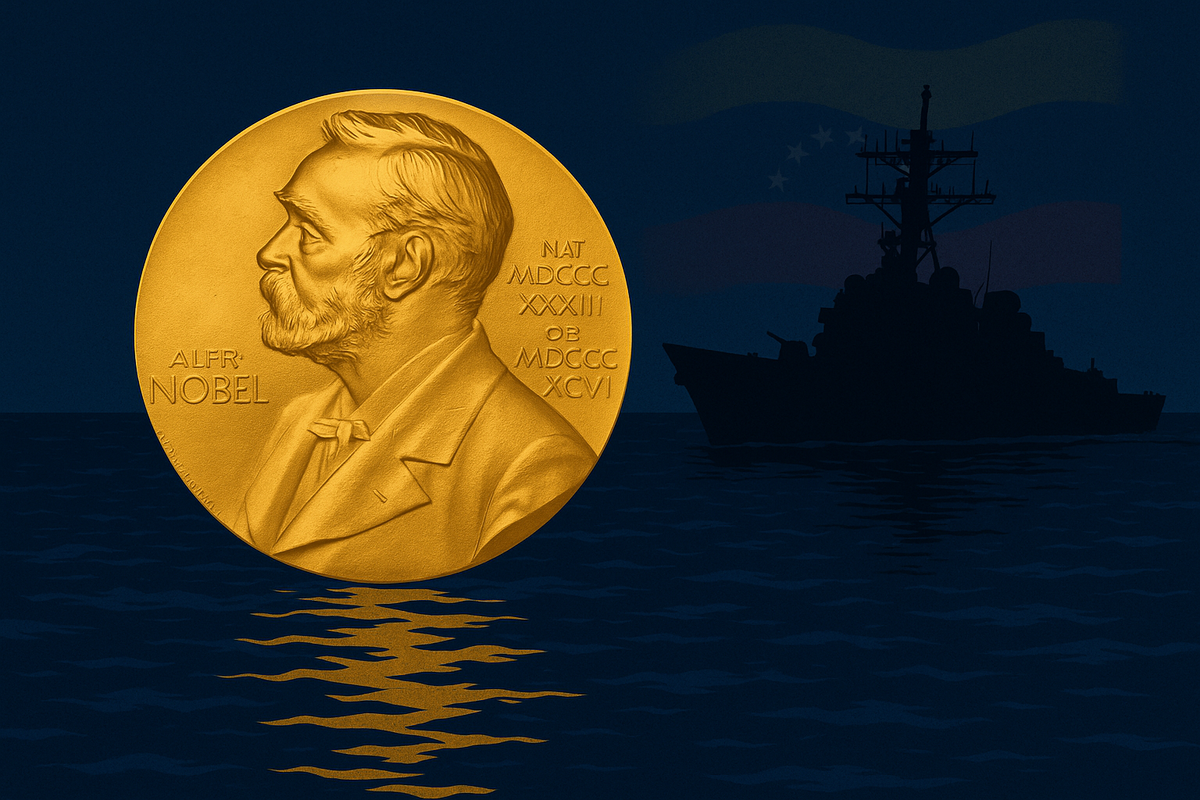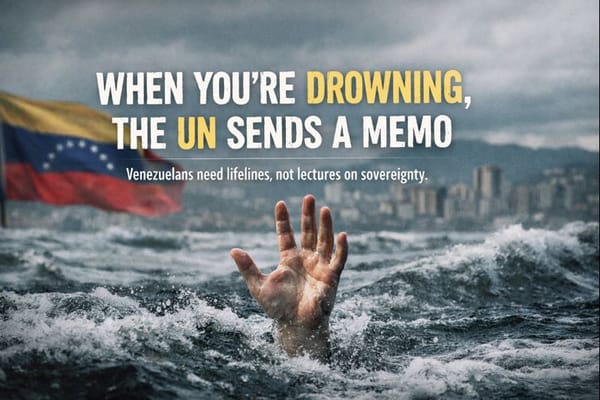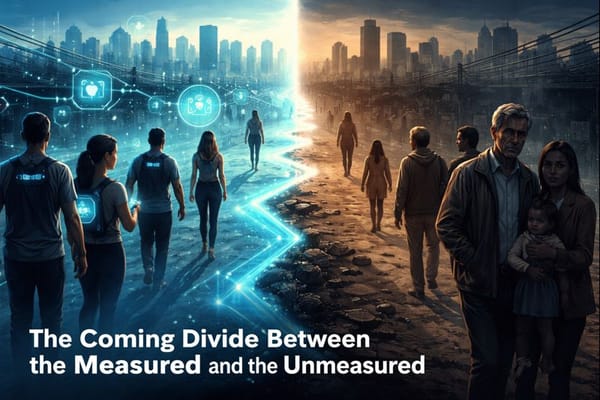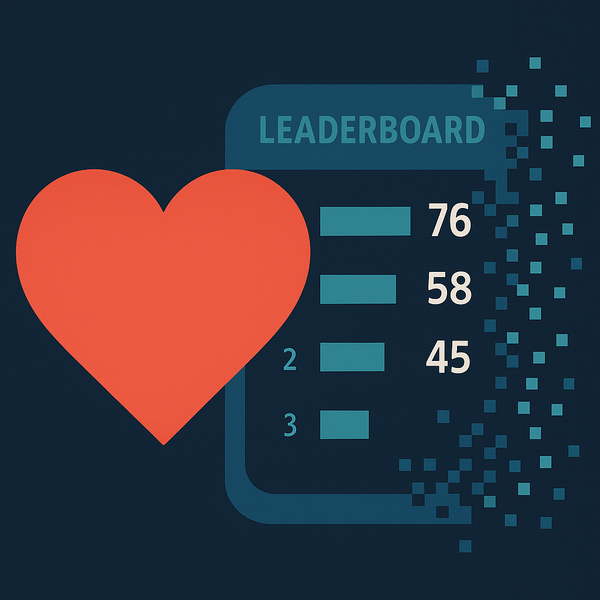When a Nobel Becomes a Battlefield: Machado, Democracy, and the U.S.–Venezuela Proxy Line

Key Takeaways
- María Corina Machado’s Nobel Peace Prize elevates Venezuela’s crisis from regional drama to global confrontation.
- The award legitimizes opposition politics and raises the risk of military escalation between the U.S. and Caracas.
- The Nobel has turned moral prestige into a geopolitical weapon.
A Nobel, Not a Peace Treaty
María Corina Machado has won the 2025 Nobel Peace Prize, honored for what the committee called her “unwavering fight for democracy and human rights in Venezuela.”
(Nobel Prize Committee, Oct 2025)
For millions of Venezuelans, the recognition was emotional, heartfelt and a validation of years of struggle against an authoritarian regime.
But in Caracas, the narco dictator Nicolás Maduro’s government denounced the award as “foreign interference dressed as morality,” accusing Norway of siding with “imperialist aggression.”
What should have been a symbol of peace instead landed as a provocation.
The Nobel has redrawn lines, between legitimacy and sovereignty, morality and force.
From Oslo to the Orinoco: The Prize That Travels
The Nobel Peace Prize is not just an award. It’s a strong diplomatic instrument, and it travels fast.
When Liu Xiaobo won in 2010, China froze relations with Norway. When Aung San Suu Kyi was celebrated, Myanmar’s junta cracked down harder. Now, Machado joins that lineage: dissidents whose recognition abroad makes them enemies at home.
Her win means she can no longer be dismissed as an internal opposition figure. She’s now an international political actor, one with moral cover and a global audience.
And that changes how the world, especially Washington, must engage with Venezuela.
War Clouds Over the Caribbean
The U.S. already has naval forces deployed in the southern Caribbean, conducting “counter-narcotics” operations that have included airstrikes on Venezuelan vessels.
(Reuters, Sept 2025)
(The Guardian, Oct 2025)
President Trump’s administration argues these are limited actions against “unlawful combatants.” But in practice, the operations blur into Venezuelan territorial space.
The Maduro regime, sensing existential threat, has mobilized militias, moved anti-air batteries to the coast, and accused Washington of preparing regime change.
(Al Jazeera, Oct 2025)
Against that backdrop, Machado’s Nobel injects a volatile new element: moral legitimacy. The award effectively reframes Venezuela’s crisis not as a domestic rebellion, but as a global test of democracy versus dictatorship.
The Nobel’s Strategic Shockwave
| Factor | Before the Nobel | After the Nobel |
|---|---|---|
| Opposition legitimacy | Contested domestically | Global recognition — harder to dismiss as “foreign-backed” |
| U.S. justification for pressure | Framed as counter-narcotics and sanctions | Now tied to “defending democracy” |
| Maduro’s threat perception | High but manageable | Existential — sees Nobel as prelude to regime-change coalition |
| International scrutiny | Regional focus | Global — EU, OAS, and UN now under pressure to react |
| Risk of miscalculation | Moderate | Elevated — symbolic stakes raise the cost of backing down |
If the U.S. signals open protection of Machado or her movement, Caracas could interpret that as a direct act of aggression.
And in a context where warships are already in the Caribbean, the margin for error is dangerously thin.
Escalation Scenarios Revisited
1. Maritime Containment (High Probability)
Continued strikes on “narco-linked” vessels, with the U.S. invoking moral authority after the Nobel.
→ Low immediate risk, but steady normalization of military pressure.
2. Targeted Air Strikes (Moderate Probability)
If Maduro retaliates or endangers Machado’s allies, Washington could justify surgical strikes on military infrastructure “to protect democracy.”
→ High escalation potential; likely UN condemnation.
3. Covert Raids or Special Operations (Low–Moderate Probability)
Potential capture or extraction missions targeting regime officials or militia leaders.
→ Risk of failure or exposure; political explosion in both countries.
4. Full Regime Change (Low Probability, Rising Rhetoric)
Still unlikely, but the Nobel removes one of Washington’s moral constraints.
→ Would trigger regional and global backlash; possible involvement of Russia or Iran.
Moral Cover and Realpolitik
The Nobel gives Washington a story: supporting democracy, not starting a war. But moral clarity can be deceptive, it often hides geopolitical intent.
In practice, the U.S. may feel more compelled to escalate limited actions while avoiding formal declarations of war.
Meanwhile, Latin American governments will face a moral dilemma: endorse Machado and risk confrontation or stay neutral and face domestic criticism.
For Europe, the stakes are reputational, the EU has condemned Venezuela’s repression but has little appetite for a proxy war in the Americas.
As in past crises, the Nobel becomes both shield and sword.
Why It Matters
Because the line between recognition and intervention just blurred.
Machado’s Nobel was meant to honor peace, but it might end up defining how far the world will go to enforce it.





